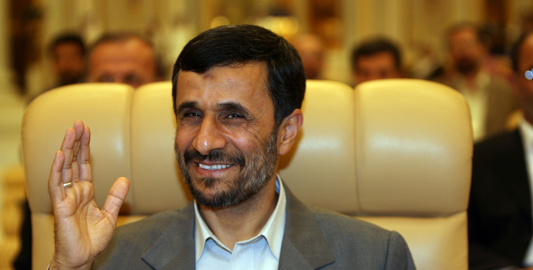Ahmadinejad’s popularity on test
Iran’s reformists and conservatives square off once again for electoral battle.

 |
| The forthcoming vote is seen as a referendum on Ahmadinejad’s rule [GETTY] |
A major political showdown is looming as Iran’s parliamentary polls scheduled for March 14 approaches.
About 600 candidates registered their names on Saturday for the elections, which is seen as a referendum on the rule of Mahmoud Ahmadinejad, the Iranian president.
The elections will not change the country’s nuclear policies, which are determined by Ayatollah Ali Khamenei, Iran’s supreme leader, but they will be a key test of Ahmadinejad’s hold on power and also a key indicator for the 2009 presidential elections.
However, there are few signs that an election is approaching. Reason: the government has banned candidates from using print material for their advertisements to prevent what it calls “enormous waste”.
Competing factions
The reformists and the conservatives are the two main factions competing for a parliamentary majority, reports Al Jazeera’s Alireza Ronaghi from Tehran.
The reformists have focused on the cultural climate in the country and want a more open attitude when it comes to individual choice.
They have also widely critisised the president’s foreign policy as well as his populist economic policies which have led to higher inflation.
Mehdi Karroubi, leader of National Trust, a reformist party, told Al Jazeera: “This is not just an ordinary election for the people. They have grown sensitive about the matter and they demand a change in the parliament composition.”
But the conservatives, who dominate the current parliament, have given Ahmadinejad full support despite his refusal to consult leaders in parliament before announcing major decisions, such as the appointment of ministers.
Asadollah Badamchian, deputy head of conservative Islamic coalition, said: “If our party leaders introduce candidates who are stronger than the current legislators and better known by the people, they’ll definitely collect more votes than their opponents.”
Limits on power
Technically the power of the Iranian parliament is limitless: it can slash the budget that the government submits and can impeach cabinet ministers and the president himself.
It is unlikely, however, that the next parliament will provide a challenge to Ahmadinejad.
The Guardian Council, a constitutional watchdog, will begin screening candidates in a week, raising fears there will be a replay of the 2004 legislative elections when the committee barred thousands of reformists from running.
The mass disqualification allowed the conservatives to regain control of the 290-seat parliament in a vote the reformists denounced as a “historical fiasco”.
Loyalty matters
Key members of the Guardian Council are handpicked by Khamenei, who has the final say on all state matters.
Ayatollah Ahmad Jannati, the Guardian Council’s chief, said last month that any candidate determined by the committee to be disloyal to the principles of Iran’s 1979 Islamic Revolution would be barred from taking part in the polls.
The announcement provoked widespread condemnation from the reformists and Mohammad Khatami, the former president, denounced the council for depriving Iranians of their rights.
Khatami has said he will not run in the elections but has begun publicly supporting reformists.
The Guardian Council will announce a final list of approved candidates on March 5, leaving only a week for campaigning.